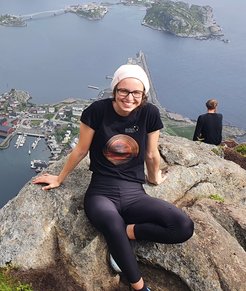Black hole kicks and better waveform models
After finishing her MSc, Angela Borchers Pascual stays in our group as a PhD student

When did you realize that physics might be the thing you would eventually study?
When I was a teenager, every year, I would attend a science festival that was taking place very close to my home town. Listening to scientists talk about their research projects made piqued my interest in science. At the same time, I had the opportunity to attend a physics summer school in the US. I learned a lot about modern physics that my high school courses did not cover. After this experience, I knew I wanted to continue learning physics at university.
How did you find your way into gravitational physics?
During my Bachelor studies, I learned general relativity from my very enthusiastic thesis supervisor, Raül Vera. At that time, I was more interested in theoretical physics, and for my thesis, I worked on understanding different black hole solutions using Penrose’s theory of conformal geometry. I loved how many of the complexities that are common in general relativity were simplified in such an elegant and visual way.
Because I had spent one semester abroad studying astrophysics related courses, I was curious about the observational sides of gravitational physics. After finishing my Bachelor in Science, I was lucky to be accepted as a summer student at the LIGO group of the UIB in Spain, where I was exposed to cutting-edge research. The working environment was very stimulating. I could feel there was a lot of excitement about the latest gravitational-wave detections. I enjoyed the experience, and it made me want to be part of the large community effort.
What makes this field special to you?
I think this field is unique because it combines theoretical aspects with astrophysical observations, with a large number of highly motivated scientists working together.
A few months ago you completed your Master’s degree. What was the main topic of your thesis?
I studied the imprint of remnant kicks in the gravitational-wave signal from merging black-hole binaries. When a binary is asymmetric, it radiates linear momentum through gravitational waves, causing the remnant black hole to gain a kick or recoil velocity. The prediction of the kick is attractive from both an astrophysical and waveform-modelling point of view.
Black-hole kicks significantly impact the population of interstellar and intergalactic black holes. For this reason, there is a strong interest in measuring the kick velocity directly from gravitational-wave events. On the other hand, the kick estimate is an interesting quantity in the context of waveform modelling because it involves the description of the signal during the highly dynamic merger phase. In my thesis, I investigated the accuracy of the waveform models used in current gravitational-wave data analysis studies, using the kick velocity.
Now that you’ve started your PhD, what will you work on?
I will continue working on binary black-hole systems from the perspective of waveform modelling. Apart from the research on remnant kicks, I will focus on understanding other physical effects and work towards improving current waveform models for the interpretation of future gravitational-wave events. As a small side activity, I also want to be involved in the data visualisation projects of the group.
What do you hope to learn during your PhD and what are your expectations for the next years?
I hope to gain expertise in the techniques used in gravitational-wave data analysis, especially in waveform modelling and parameter estimation. I also hope to improve my research skills, such as critical thinking, communication and scientific writing skills. At some point, it would be nice to attend in-person conferences and workshops, but I’m happy with the many opportunities we already have at the institute.
Besides physics at the AEI what are you looking forward to do in Hannover or Germany?
I look forward to spending time with friends and family without having to worry too much about the pandemic. I would also like to travel to new places in Germany. I especially want to visit the place where my great-grandparents lived. And if I still find some time, I'll try to improve my German.












